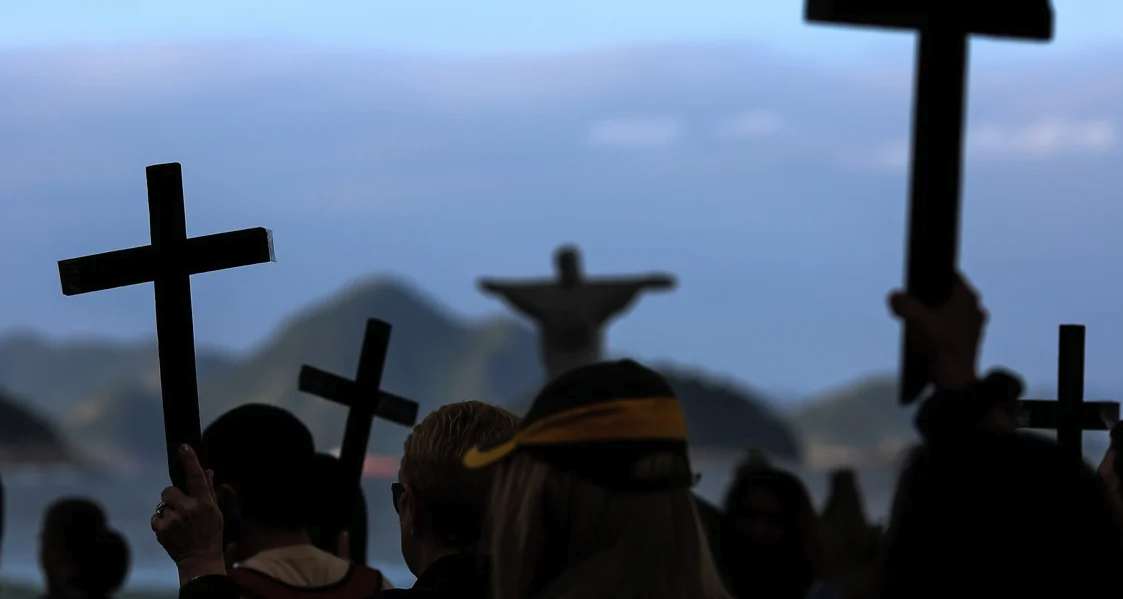The 2022 Census offers an accurate picture of how Brazil’s religious landscape has changed over the past decade. While the majority of the population still identifies as Catholic, the proportion of believers has fallen significantly once again, confirming a continuing trend of declining dominance. Evangelicals, for their part, continue to grow, but at a slower pace than some analysts projected. At the same time, both the number of citizens declaring themselves non-religious and the number of followers of Afro-Brazilian religions are increasing, reinforcing the idea of an increasingly plural Brazil in terms of faith.
Compared to 2010, Catholicism lost several percentage points and now represents just over half of the population. Spiritist movements also decreased slightly. On the other hand, the number of evangelicals increased, as did that of Afro-Brazilian religions—which registered significant growth—and those declaring no religion, now exceeding 9% of Brazilians. While absolute figures matter, the most interesting aspect lies in the dynamics of these changes: it is no longer possible to speak of a single process of religious replacement, but rather of a gradual diversification of Brazil’s religious landscape.
These results refute the thesis of demographer José Eustáquio Diniz Alves of the Federal University of Minas Gerais, who projected that evangelicals would be the majority by the 2030s. For Alves, the steady decline of Catholics and the rapid growth of evangelicals made this scenario inevitable. However, reality revealed a more complex picture. As sociologist Paul Freston of the Federal University of São Carlos has argued in various surveys, it is unlikely that Catholics will fall below 40% of the population, and evangelicals will never surpass 35%. The idea of a linear transition toward an evangelical majority ignores the reflexive and active nature of socio-religious dynamics: actors are not mere receivers of trends but react and adapt their practices, altering the course of projections.
Beyond the numbers, what the Census confirms is that religion in Brazil is undergoing reconstitution, with profound political and social consequences. The evangelical segment, even without reaching a majority, has consolidated considerable political influence. The Evangelical Parliamentary Front (FPE), also known as the “Bible Caucus,” is considered by analysts such as sociologist Christina Vital—in articles published in O Globo—as one of the most cohesive and influential groups in the National Congress. Its conservative agenda has shaped key debates on education, family, reproductive rights, and public policies in recent years. Magali Cunha, in an analysis published in Carta Capital, agrees that this parliamentary group can wield influence beyond the demographic proportion of evangelicals, thanks to its organizational capacity and territorial presence.
The Census also provides revealing data on the internal composition of religious communities. Afro-Brazilian religions, historically linked to the Black population, have attracted a growing number of white believers over the past decade, nearly tripling between 2010 and 2022. Meanwhile, an increase in the Black population within evangelical churches has been observed, indicating greater mobility and permeability between different religious traditions. These intersections weaken the idea of rigid, homogeneous blocs, showing instead a dynamic and constantly changing religious field.
The educational profile of evangelicals also illustrates the social reach of this group. While there has been an increase in secondary and incomplete higher education levels, evangelicals remain prominent among sectors with low levels of education. This connects them closely with the most vulnerable populations, where their influence extends beyond the spiritual. Opening a church in Brazil is a simple process: in 2019 alone, more than 6,300 new evangelical churches were established, averaging about 17 churches per day. This territorial expansion allows many congregations to offer not only religious services but also social assistance: food distribution, tutoring, legal advice, and professional support. The simple, direct language of pastors also facilitates communication with communities with low educational attainment, reinforcing a sense of belonging and support.
However, this proximity also generates paradoxes. While churches promise prosperity and personal growth, in many cases they function as spaces where the absence of public policies is compensated for with discourses of resilience and acceptance. The promise of “making do with what one has” partially replaces demands for more structural social transformations. This phenomenon helps explain why evangelicals maintain a solid base among popular sectors, even when their living conditions do not substantially improve.
At the same time, another category is gaining prominence: the non-religious. Their steady growth, though less spectacular than that of evangelicals in past decades, reflects broader cultural transformations. According to economist Deborah Bizarria, in a column published in Folha de S. Paulo, this group not only challenges the thesis of an “evangelical explosion,” but also introduces new variables into economic and social analysis. The non-religious influence consumer markets and cultural dynamics, forcing a rethinking of the relationship between religion, economy, and politics in contemporary Brazil.
The panorama emerging from the Census is, therefore, that of a less homogeneous and more pluralistic country in religious terms. Catholic hegemony continues to decline, but without disappearing; evangelicalism maintains its influence and political power, though its growth has lost the momentum that once projected it as an inevitable majority; Afro-Brazilian religions demonstrate vitality and appeal beyond their historical bases; and non-religious identities continue advancing, reshaping the landscape.
Brazil thus becomes a laboratory where religion, politics, and economics are increasingly intertwined. The “evangelical explosion” has not materialized as some anticipated, but religious pluralism is already an unavoidable reality. And within this pluralism may lie the key to understanding the tensions and possibilities of Brazil’s future.
*Machine translation, proofread by Ricardo Aceves.














